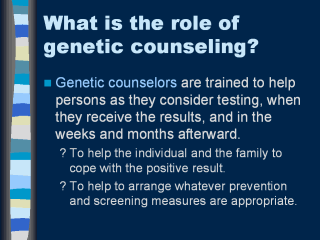 |
In the sophisticated programs that are pioneering predictive genetic tests for
cancer, genetic counseling plays a vital role. Persons considering genetic
testing meet with specially trained health professionals before testing begins,
when they receive the test results, and in the weeks and months afterwards.
Before testing, the counselors try to make sure that the person is
psychologically prepared to cope with the possibility of a positive test, and
that he or she has enough balanced information to be able to formulate a truly
informed consent. If the person decides to proceed with testing, counselors help
the individual and the family adjust to the test results, and they help them
arrange whatever prevention and screening measures are appropriate.
|
